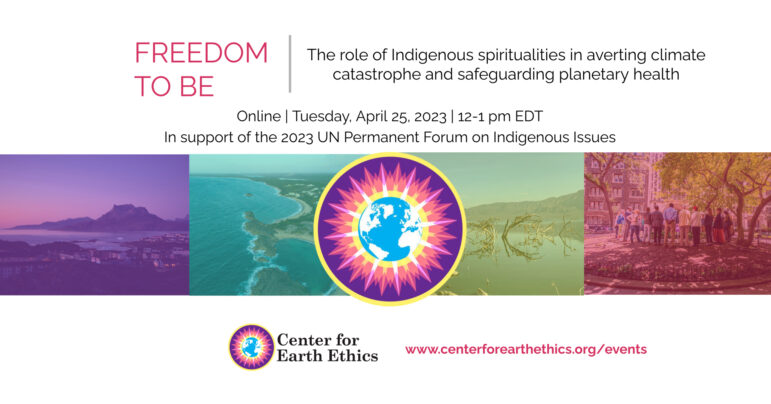
“Freedom to Be” to Address Indigenous Spiritualities’ Role in Averting Climate Catastrophe
Freedom to Be: The role of Indigenous spiritualities in averting climate catastrophe and safeguarding planetary health
Tuesday, April 25, 2023 — Noon (New York time)
Online
Indigenous communities around the world suffer from the consequences of the extractionist industries and land removal policies that drive climate change. At the same time, Indigenous spiritualities connect to the Earth and environment in ways that hold the promise of a true ecological future.
On Tuesday, April 25 at noon (New York time), the Center for Earth Ethics will host “Freedom to Be,” an online conversation with an international panel of Indigenous representatives about the spiritual dimensions of biocultural heritage, how traditional Indigenous beliefs relate to ecologically sound cultural practices, and the boundaries that are necessary to protect Indigenous peoples’ beliefs and life systems. This event will center Indigenous voices and spiritual perspectives in addressing climate change.
From left: Carson Kiburo, Qivioq Løvstrøm, Donato Bumacas, R. Múkaro Borrero
Confirmed speakers include community organizer and youth leader Carson Kiburo, executive director of the Jamii Asilia Centre (Kenya), anthropologist and activist Qivioq Løvstrøm, chair of the Human Rights Council of Greenland and assistant professor at the University of Greenland, and Donato Bumacas, executive director of the Kalinga Mission for Indigenous Children and Youth (Philippines). Kasike R. Múkaro Borrero (Guainía Taíno Tribe) will moderate. Karenna Gore, CEE’s executive director, will give opening remarks.
This conversation is an official side event for the United Nations Permanent Forum on Indigenous Issues, which is currently assembled at UN headquarters in New York. Panelists will address the recommendations offered by the Special Rapporteur on Freedom of Religion or Belief’s 2022 report on Freedom of Religion or Belief for Indigenous Peoples, which was the subject of an October 2022 CEE forum.
CEE gratefully acknowledges the support of UN Office of the Special Rapporteur for Freedom of Religion or Belief, the UN Office of the Special Rapporteur on the Rights of Indigenous Peoples, the Climate Heritage Network, the NGO Committee on the Rights of Indigenous Peoples, the United Confederation of Taino People, Project Access Indigenous Partnership, the Inclusive Conservation Academy, and the Jamii Asilia Centre in organizing this event.
Speaker Biographies
Carson Kiburo
Executive Director of the Jamii Asilia Centre, Community Organizer, and Youth Leader
Carson is a youth leader and a community organizer from the Endorois of Kenya. He works on Indigenous people’s rights, youth empowerment and global governance. Carson’s journey and inspiration to commit his life to serve the indigenous peoples were powered by the Tribal Link Foundation’s Project Access Capacity Building training for Indigenous Peoples in 2018 in New York—a program that supports Indigenous peoples’ participation in multi-stakeholder forums where decisions are being made that affect their human rights, lands and resources, cultures, and livelihoods. Carson has human rights training at Centre for Human Rights, University of Pretoria and the Defenders Coalition’s Human Rights Academy, among others. He is a past co-chair of the Global Indigenous Youth Caucus.
Qivioq Løvstrøm
Anthropologist, Activist, Chair of the Human Rights Council of Greenland, and Assistant Professor at the University of Greenland
Qivioq is an Inuk activist and scholar that has extensive experience advocating for the rights of Indigenous peoples. She has served in positions for the Foreign Ministry of Greenland and currently serves as the Chair of the Human Rights Council of Greenland. She is a former co-chair of Global Indigenous Youth Caucus and is currently the group’s advisor. She has represented Greenland in various fora such as the UN, the EU and other regional or international fora. Qivioq lectures in historical methodss and their decolonization at the University of Greenland as an assistant professor.
Donato Bumacas
Executive Director, The Kalinga Mission for Indigenous Children and Youth
The Kalinga Mission for Indigenous Children and Youth, led by Donato Bumacas, promotes values of biodiversity conservation, with the goal of poverty reduction. These values are upheld using Indigenous traditional knowledge systems andd technologies to conserve and maintain the local forests. Sustainable Indigenous agricultural technology is implemented, with the goal of passing these systems down to future generations, as this knowledge was passed down to them.
Kasike R. Múkaro Borrero
Guainía Taíno Tribe
Founder and Executive Director, Center for Earth Ethics
NB. This article has been updated to reflect Donato Bumacas’s participation on the panel.
